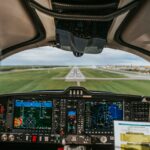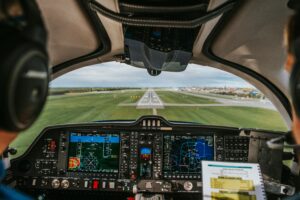Piloting an aircraft is a challenging and rewarding career that offers plenty of opportunities for those with the right skills and training. In this article, we’ll cover the key things you need to know about pursuing a career as an airline pilot, including the educational requirements, the different types of pilot jobs available, and what you can expect in terms of salary and career prospects.
The educational requirements for becoming a pilot
To become a pilot, you’ll need to meet certain educational and training requirements. These can vary depending on the type of piloting job you’re interested in and the specific airline or organization you want to work for. In general, however, you’ll need to obtain a bachelor’s degree in a field related to aviation, such as aerospace engineering or aeronautical science. Many aspiring pilots choose to study at a college or university that offers specialized aviation programs, which can provide hands-on experience and training in areas such as flight simulation and aircraft maintenance.
Once you’ve earned a bachelor’s degree, you’ll need to complete additional flight training in order to obtain your commercial pilot’s license. This typically involves a combination of classroom instruction, simulated flight exercises, and actual flying time. Depending on your goals and the specific requirements of the airline or organization you’re hoping to work for, you may also need to earn additional certifications or ratings, such as a multi-engine rating or an instrument rating.
What subjects aspiring pilots should focus on
Aspiring pilots should focus on subjects that will help them develop a strong foundation in aviation and related fields. Some specific courses and subjects that may be beneficial for aspiring pilots to focus on in school include:
- Aviation science: This subject covers the principles and practices of aviation, including topics such as aircraft design, performance, and operation.
- Mathematics: Pilots need to have a strong foundation in math in order to understand and perform calculations related to aircraft performance, navigation, and other critical functions.
- Physics: Physics is an important subject for pilots to understand, as it covers the principles of motion, energy, and matter, which are all relevant to the operation of aircraft.
- Meteorology: Pilots need to be able to understand and interpret weather patterns and conditions in order to safely plan and execute flights.
- Communication skills: Pilots must be able to communicate effectively with air traffic controllers, ground crew, and passengers. As such, it’s important for aspiring pilots to focus on developing strong communication skills.
- Leadership and teamwork: Pilots often work in teams and must be able to lead and work effectively with others in order to safely and efficiently operate an aircraft.
- Problem-solving and decision-making: Pilots need to be able to think on their feet and make quick, informed decisions in order to respond to unexpected events or emergencies.
In addition to these specific subjects, aspiring pilots should also focus on maintaining strong grades and a solid academic record, as this can be important in qualifying for pilot training and finding job opportunities.
Different career paths available to pilots
Once you’ve completed your education and training, you’ll be ready to start looking for pilot jobs. There are a number of different career paths available to pilots, depending on your interests and goals. For example, you might choose to work for a major airline, flying commercial airliners to destinations around the world. Alternatively, you might consider a career as a military pilot, flying aircraft for the armed forces. Other options include working as a private pilot, flying small planes for individuals or businesses, or becoming an air traffic controller, helping to manage the flow of aircraft in the sky.
No matter which career path you choose, it’s important to remember that pilots are highly skilled professionals who need to maintain a high level of training and expertise throughout their careers. Pilots earn competitive salaries, with the potential for high-paying jobs at major airlines and other organizations. However, the demands of the job can be demanding, with irregular schedules and long periods of time away from home. Communication skills are also crucial for pilots, as they must be able to effectively communicate with air traffic controllers, ground crew, and passengers.
Tips for finding and choosing the right aviation school or program
Here are some tips for finding and choosing the right aviation school or program:
- Determine your goals: Before you start looking for an aviation school or program, it’s important to have a clear idea of what you hope to achieve. Do you want to become a commercial pilot, a military pilot, or a private pilot? Do you want to earn a bachelor’s degree, or are you more interested in focused training and certification? Knowing what you want to accomplish will help you narrow down your options and find the right program for you.
- Research programs and schools: Once you know what you’re looking for, start researching different aviation schools and programs to see what’s available. Look for programs that offer the type of training and education you need to achieve your goals, and consider factors such as cost, location, and reputation.
- Consider cost and financial aid: Aviation programs can be expensive, so it’s important to consider cost when choosing a school. Look for programs that offer financial aid or scholarships to help offset the cost of tuition and other expenses.
- Consider location: The location of an aviation school or program can be an important factor to consider, especially if you plan to live on campus or if you want to be close to major airports or other aviation-related organizations.
- Check the school’s reputation: Reputation is another important factor to consider when choosing an aviation school or program. Look for schools with a strong track record of preparing students for successful careers in aviation, and ask for references or testimonials from current or former students to get a sense of what it’s like to study at the school.
- Visit the school: If possible, try to visit the school or program you’re considering in person to get a feel for the campus and facilities. This can be a great way to learn more about the program and see if it’s a good fit for you.
- Talk to current students and alumni: Another valuable way to get a sense of what it’s like to study at a particular school or program is to talk to current students or alumni. Ask them about their experiences, and find out what they liked and didn’t like about the program.
By following these tips and doing your research, you should be able to find an aviation school or program that meets your needs and helps you achieve your goals.
If you’re considering a career as a pilot, it’s important to do your research and carefully weigh the pros and cons of this exciting and rewarding profession. By choosing the right educational program and working hard to earn your pilot’s license, you’ll be well on your way to a successful and fulfilling career in the aviation industry.








